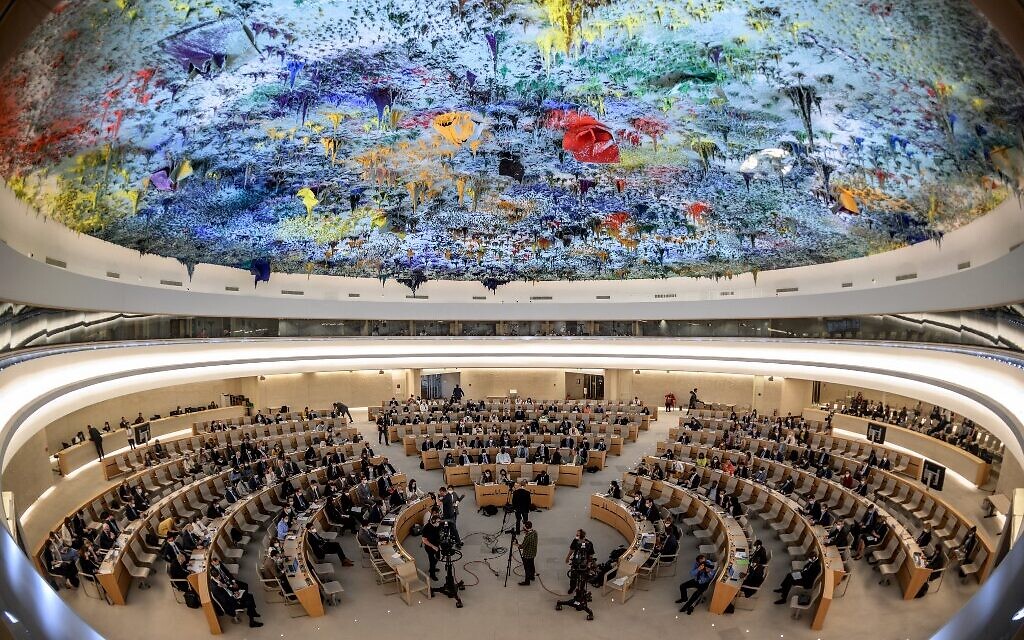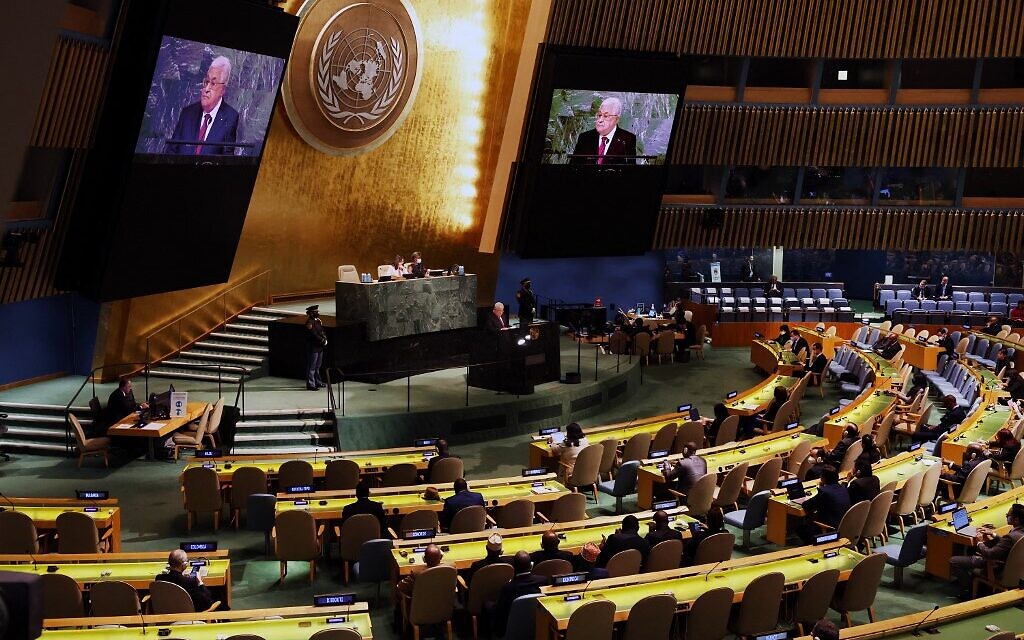A bill calling to end a United Nations probe against Israel has been reintroduced to the US Congress after similar legislation failed to advance last year.
The US has repeatedly opposed the contentious Commission of Inquiry against Israel, but continues to fund the investigation as part of its budget to the UN, despite opposition from Israel and some US Congress members.
The “COI Elimination Act” aims to make it official US policy to “seek the elimination” of the Commission of Inquiry and to “combat systemic anti-Israel bias at the United Nations Human Rights Council and other international fora,” and to cut US funding for the commission.
Florida House Representative Greg Steube submitted the bill earlier this month. It has been referred to the House Committee on Foreign Affairs and has enlisted 17 co-sponsors, all Republicans.
The UN Human Rights Council’s Commission of Inquiry against Israel is overwhelmingly critical of the Jewish state and its reports almost entirely ignore Palestinian terrorism and violence and blame Israel for the conflict. One of its three members last year but remains in his position and has not faced any UN repercussions.
Get The Times of Israel's Daily Edition by email and never miss our top stories
Steube introduced an identical bill to the House last year, garnering 119 co-sponsors from both sides of the aisle. The Florida Congressman was badly injured in a fall last week and unavailable to comment on the new legislation.
Another COI Elimination Act put forth in the Senate last year had bipartisan support from 13 senators.
The two bills died amid some Democratic party opposition.
US House Representative Barbara Lee, a California Democrat, said in June at the House Appropriations Committee that the legislation would “politicize” Israel.
“It’s not a constructive bipartisan proposal but rather an effort to make Israel a wedge issue,” she said, while acknowledging US efforts to oppose the Human Rights Council’s “unfair and disproportionate focus on Israel.”
Lee said the US pays “in one lump sum” and could not divvy up funding to the UN because it would weaken US leverage at the world body.
The US has previously restricted funding for UN programs tied to the Palestine Liberation Organization, however.
Lawmakers last year also nixed a withholding provision from the 2023 draft appropriations act that would have denied US funding to the Commission of Inquiry.

Illustrative: A general view of the room hosting a special session of the UN Human Rights Council on Ukraine, in Geneva, on May 12, 2022. (Fabrice Coffrini/AFP)
The US State Department and mission to the UN have publicly opposed the commission into Israel, although the US is contributing funding to the investigation, and the world court case against Israel the commission recommended, as part of the US budget to the UN.
The US mission opposed the creation of the commission in 2021, calling it disproportionate.
The State Department last year called the commission “a one-sided, biased approach that does nothing to advance the prospects for peace” and decried it as “open-ended and vaguely defined.”
Twenty-two countries led by the US at the UN Human Rights Council signed an open letter last year saying the investigation was evidence of “long-standing disproportionate scrutiny” of Israel.
Earlier this month, however, the US mission to the UN trumpeted its success in the UN Fifth Committee budget negotiations, including “full funding for Human Rights Council mandates.” The US is the largest contributor to the UN program budget of $3.4 billion, providing 22% of the total.
“The United States, along with its allies and partners, concluded 2022 with a number of successes during the UN General Assembly Fifth Committee session,” the statement said. The mission did not respond to a request for comment on funding decisions.
The Commission of Inquiry was established in 2021 with $4,151,800 in funding for the first year. Its funding for 2023 was already included in the Human Rights Council budget and did not come up for a vote.
The commission’s budget is relatively high — a probe into human rights in Iran last year received $2,764,000, and only lasts for one year, for example.
In addition to the Commission of Inquiry, there is also an open-ended Human Rights Council special rapporteur investigating Israel. The current mandate-holder, Francesca Albanese, has a history of antisemitism and is overwhelmingly critical of Israel. The US mission to the UN has said it was “appalled by her conduct” and some Congress members have called for her removal. Albanese has also not faced any UN repercussions for her antisemitism.

UN commissioners Chris Sidoti, left, Navi Pillay, center, and Miloon Kothari, right, discuss their probe into Israel and the Palestinians at the United Nations in New York, October 27, 2022. (Luke Tress/Times of Israel)
Israel, with two open-ended investigations against it, is the only country under such investigatory scrutiny by the UN.
The Commission of Inquiry, in a report last year, recommended that the General Assembly request an advisory opinion on Israel from the International Court of Justice, giving the plenary the impetus to make the formal request months later. That report was harshly criticized by Israel for omitting mention of recent terror and security threats against the Jewish state.
The request promoted by the Palestinians asks the court to weigh in on Israeli “annexation,” the “legal status of the occupation” and Israeli measures “aimed at altering the demographic composition, character and status of the Holy City of Jerusalem.”
The International Court of Justice, also known as the world court, is the top UN court for mediating disputes between countries. It last ruled on Israel in 2004.
The US voted against the resolution calling for the court opinion when it first came up before the General Assembly’s Fourth Committee in November.
The proposal passed, then headed to the Fifth Committee to approve its budget of $247,800.
At the budget hearing on December 30, Israel proposed a vote to pull funding from the court’s investigation, saying the probe was “part of a wide campaign of systematic discrimination against Israel at the UN.” The Israeli representative asked member states to also vote against the funding.
That vote failed — 105 voted in favor of the budget, 13 against, and 37 abstained. The US abstained, in a rare instance of the US not siding with Israel at the UN.

Illustrative: Palestinian Authority President Mahmoud Abbas addresses the 77th session of the United Nations General Assembly at the UN headquarters in New York on September 23, 2022. (Spencer Platt/Getty Images/AFP)
The Palestinian representative thanked the countries that supported the budget, saying, “This attempt has utterly failed.”
“For many countries, this vote is also a reflection of their principled support for Palestine and its people. We thank all of you for this clear support for the International Court of Justice’s ability to perform its duties,” he said.
The entire $3.4 billion UN program budget for 2023 was then ushered through, and Israel formally disassociated itself from the decision to fund the world court and other anti-Israel decisions.
After the budget approval, the resolution headed to the General Assembly plenary. The world court request was approved by a vote of 87 in favor, 26 against and 53 abstentions, with the US voting against.
Anne Bayefsky, a human rights lawyer and professor who monitors the UN, said the US budget policy for the UN “leaves American taxpayers on the hook for the overt funding of UN-driven antisemitism.”
“The Biden administration claims to want to combat antisemitism and to be fundamentally opposed to the inquiry, its creation and its funding by the UN. So it is high time to put its money where its mouth is,” said Bayefsky, the director of Touro University’s Institute on Human Rights and the Holocaust.
The world court said earlier this month that it had officially received the request to rule on Israel from the General Assembly.
Israel argues the investigations are part of a larger, discriminatory pattern at the UN. The General Assembly condemned Israel more than all other countries combined last year.
Israel’s ambassador to the UN, Gilad Erdan, said last week on Holocaust Remembrance Day that “when it comes to fighting antisemitism, sadly, the UN ignores its purpose,” highlighting the Human Rights Council’s focus on Israel and antisemitic statements by UN staffers and investigators.


